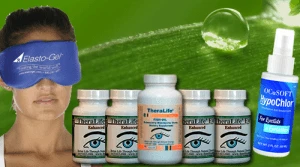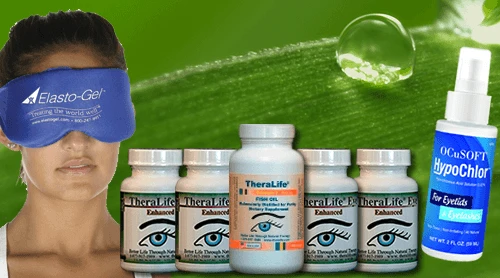TheraLife stands out as the only company offering oral eye treatment care, providing unique benefits to those suffering from eye conditions such as uveitis, blepharitis, and dry eyes. Their products are designed to optimize ocular health by addressing inflammation and improving tear production naturally. TheraLife’s approach combines the healing power of nature with advanced scientific research, ensuring effective relief and long-term eye health. Customers can explore various products tailored to their specific needs, offering a holistic approach to managing eye conditions.
In addition to its innovative products, TheraLife offers resources and guides on its website, providing valuable insights into managing different eye conditions at home. From dietary recommendations to lifestyle adjustments, TheraLife empowers its customers with the knowledge to support their eye health naturally. Whether dealing with recurrent issues or seeking preventive care, TheraLife’s comprehensive solutions ensure that customers receive the best possible care for their eyes.
Best Dry Eye Treatment For Uveitis From TheraLife- When Drops Don’t Work.
Key Takeaways
- Berries are rich in antioxidants like anthocyanins and vitamin C, helping to reduce oxidative stress in uveitis.
- Leafy greens such as spinach and kale provide lutein and zeaxanthin, protecting retinal cells from inflammation and oxidative damage.
- Citrus fruits offer flavonoids and vitamin C, supporting immune health and decreasing inflammatory mediators in the eyes.
- Nuts and seeds supply vitamin E and omega-3 fatty acids, delivering anti-inflammatory and antioxidant benefits for eye health.
- Turmeric and ginger contain powerful natural compounds like curcumin and gingerol that inhibit inflammatory pathways and protect ocular tissues.
Berries: Potent Polyphenols for Eye Health
Although berries are often promoted for their high polyphenol content, current clinical evidence doesn’t support a direct benefit of these compounds in managing uveitis.
When you consider blueberry benefits and other antioxidant varieties like blackberries, raspberries, and strawberries, it’s clear they contain anthocyanins, vitamin C, and flavonoids—all known antioxidants.
These nutrients help neutralize free radicals, potentially reducing oxidative stress, which is a factor in several ocular pathologies.
However, randomized controlled trials specifically evaluating berries for uveitis treatment are lacking.
You can include a variety of berries in your diet to support overall eye health, as their antioxidant properties may contribute to systemic health.
Still, don’t rely solely on these foods for uveitis management; clinical interventions remain the cornerstone of care.
Adding Omega 3 Fish Oil, as found in the TheraLife® Chronic Dry Eye Bundle, may further support ocular health due to its anti-inflammatory properties.
Leafy Greens: Lutein and Zeaxanthin Powerhouses
Beyond berries, leafy greens offer distinct antioxidant benefits due to their high concentrations of lutein and zeaxanthin. These carotenoids accumulate in the retina, where they function as natural filters for high-energy blue light, reducing oxidative stress that contributes to uveitis and other ocular conditions. You’ll find ideal levels in spinach, kale, and collard greens, making them essential for supporting eye health. Clinical studies indicate that consistent intake of lutein and zeaxanthin correlates with improved visual function and reduced inflammation in ocular tissues. To maximize nutrient absorption, pair leafy greens with healthy fats, such as olive oil. Including these vegetables in your diet can enhance your defense against free radicals, protect retinal cells, and promote overall ocular resilience, offering targeted nutritional support for uveitis management. Natural approaches to uveitis treatment include dietary modifications and herbal remedies as part of a holistic management plan.
Nuts and Seeds: Vitamin E and Omega-3 Boost
When you incorporate nuts and seeds into your diet, you supply your body with potent antioxidants like vitamin E and essential omega-3 fatty acids, both of which play crucial roles in modulating ocular inflammation.
Clinical studies demonstrate that vitamin E neutralizes free radicals, reducing oxidative stress implicated in uveitis pathogenesis. Omega-3 fatty acids from specific seed varieties and nut benefits, such as those found in walnuts and flaxseeds, exert anti-inflammatory effects by decreasing the production of pro-inflammatory cytokines.
Including a range of nuts and seeds supports retinal health, stabilizes cellular membranes, and may alleviate symptoms associated with uveitis.
- Choose almond and sunflower seeds for maximum vitamin E intake.
- Add chia or flaxseeds for plant-based omega-3s.
- Rotate nut benefits and seed varieties for thorough nutrient coverage.
Additionally, incorporating fresh vegetables while reducing processed foods can further aid in symptom improvement, as part of a holistic approach to managing uveitis.
Colorful Bell Peppers: Rich in Vitamin C
You’ll find that colorful bell peppers offer a potent source of vitamin C, which plays a critical role in immune system enhancement. Clinical studies indicate that vitamin C supports leukocyte function and reduces oxidative stress in ocular tissues. Adding bell peppers to your diet may help protect eye structures from inflammatory damage linked to uveitis. Including foods rich in antioxidants, like omega-3 fatty acids, is beneficial for overall eye health and can complement the anti-inflammatory properties of vitamin C.
Immune System Enhancement
Colorful bell peppers serve as a significant source of vitamin C, a key nutrient involved in supporting immune function. When you incorporate these peppers into your diet, you directly enhance your body’s immune response through several mechanisms.
Vitamin C optimizes the function of leukocytes, your body’s primary defense cells, and improves nutrient absorption, particularly iron, which is essential for robust immune activity. Clinical studies indicate that adequate vitamin C intake can shorten the duration and severity of inflammatory responses, which is particularly relevant in conditions like uveitis. Additionally, regular exercise can aid in reducing inflammation, complementing the immune-boosting effects of vitamin C.
Here’s how vitamin C from bell peppers supports your immune system:
- Enhances leukocyte (white blood cell) function, supporting pathogen defense.
- Improves nutrient absorption, facilitating efficient cellular repair.
- Modulates inflammatory cytokines, contributing to a balanced immune response.
Eye Tissue Protection
For those managing autoimmune conditions like Sjögren’s syndrome, focusing on anti-inflammatory foods can further enhance the benefits of consuming vitamin C-rich foods like bell peppers.
Turmeric and Ginger: Natural Anti-Inflammatory Spices
You can support ocular health in uveitis by incorporating turmeric and ginger, two spices recognized for their anti-inflammatory effects. Curcumin, the active compound in turmeric, has demonstrated the ability to modulate inflammatory pathways implicated in uveitis. Ginger contains bioactive constituents that can further reduce inflammatory mediators and help soothe ocular discomfort. Additionally, the use of anti-inflammatory foods is crucial for managing uveitis symptoms, as they can play a significant role in reducing inflammation naturally.
Curcumin’s Role in Uveitis
While research increasingly explores the connection between natural compounds and ocular health, curcumin—the active component of turmeric—has demonstrated notable anti-inflammatory and antioxidant properties relevant to uveitis management.
You’ll find that curcumin benefits include modulation of inflammatory cytokines and inhibition of oxidative stress, both of which play critical roles in the pathogenesis of uveitis. Clinical studies suggest curcumin can reduce intraocular inflammation by targeting pathways such as NF-κB and downregulating pro-inflammatory mediators.
Here’s what you should know about curcumin’s role in uveitis management:
- Curcumin inhibits production of inflammatory cytokines, reducing ocular tissue damage.
- It acts as a potent antioxidant, neutralizing reactive oxygen species in the eye.
- Clinical trials indicate curcumin may improve visual outcomes and lower relapse rates in uveitis patients.
Understanding the safety and effectiveness of natural treatments is essential before incorporating curcumin into a uveitis management plan.
Ginger’s Soothing Properties
Alongside curcumin, ginger stands out as another spice with significant anti-inflammatory and antioxidant capacities relevant to uveitis care. Scientific studies show ginger’s active compounds, such as gingerol and shogaol, inhibit pro-inflammatory cytokines and oxidative stress, which are pivotal in uveitis pathogenesis. By reducing inflammatory mediators, ginger benefits you by supporting ocular immune modulation and fostering soothing effects for irritated eye tissues. Clinical trials suggest regular dietary inclusion of ginger may diminish symptom severity and flare frequency in inflammatory eye disorders. Additionally, incorporating ginger in your diet can reduce reliance on eye drops for dry eye relief, similar to how TheraLife Eye capsules provide a natural alternative.
Here’s how ginger can impact uveitis-related inflammation:
| Compound | Mechanism | Clinical Effect |
|---|---|---|
| Gingerol | Cytokine inhibition | Reduced inflammation |
| Shogaol | Antioxidant activity | Less oxidative stress |
| Zingerone | Immune modulation | Alleviated symptoms |
| Paradol | NF-κB suppression | Lower flare frequency |
| 6-Gingerol | COX-2 inhibition | Decreased pain |
Citrus Fruits: Flavonoids for Immune Support
Although citrus fruits are widely recognized for their vitamin C content, their flavonoid compounds—such as hesperidin, naringenin, and quercetin—also play significant roles in modulating immune function.
When you consume oranges, lemons, or grapefruits, you gain more than just antioxidant support; you access a spectrum of flavonoid sources that target oxidative stress and immune dysregulation implicated in uveitis.
Clinical studies show that these flavonoids can inhibit pro-inflammatory cytokines and stabilize immune cell responses, offering measurable citrus benefits for ocular health.
- Flavonoids in citrus fruits reduce reactive oxygen species, thereby protecting ocular tissues from damage.
- Hesperidin and naringenin modulate immune cell signaling, reducing inflammatory mediators linked to uveitis.
- Regular intake of diverse citrus fruits guarantees a broad intake of flavonoid sources supporting immunological balance.
A wraparound design in sunglasses can also help minimize peripheral UV exposure, providing additional protection for sensitive eyes.
Tomatoes: Lycopene for Reduced Eye Inflammation
Because tomatoes are rich in lycopene, a potent carotenoid antioxidant, they offer targeted protection against oxidative stress in ocular tissues. Lycopene has demonstrated anti-inflammatory effects that can help reduce intraocular inflammation associated with uveitis.
By incorporating diverse tomato varieties—such as Roma, cherry, or heirloom—you can optimize your intake of lycopene and other phytonutrients. Cooking tomatoes with a small amount of healthy fat, like olive oil, greatly enhances lycopene absorption, making it more bioavailable to your body.
Clinical studies indicate that regular dietary lycopene intake may help modulate inflammatory pathways and support retinal health. Integrating tomatoes into your meals is a simple, evidence-based strategy to harness their antioxidant activity, potentially reducing eye inflammation and supporting your visual well-being if you’re managing uveitis.
Best Dry Eye Treatment For Uveitis From TheraLife- When Drops Don’t Work.
Frequently Asked Questions
Can Antioxidants Interact With Prescription Medications for Uveitis?
You should be aware that antioxidant interactions with prescription medications for uveitis can affect medication safety.
Some antioxidants, like vitamin E and C, may alter the absorption or metabolism of corticosteroids or immunosuppressants by impacting cytochrome P450 enzymes. This could reduce drug efficacy or increase side effects.
Always consult your ophthalmologist or pharmacist before starting antioxidant supplements to guarantee safe, evidence-based integration with your current uveitis treatment regimen.
How Quickly Can Dietary Changes Impact Uveitis Symptoms?
Have you ever wondered how fast your body responds to dietary adjustments for symptom relief in uveitis?
While individual responses vary, clinical studies suggest that anti-inflammatory dietary changes may start to influence inflammation markers within a few weeks.
However, you shouldn’t expect immediate resolution of symptoms.
Consistent long-term dietary adjustments support ocular health, but you’ll still need medical management for acute uveitis, as diet alone rarely provides rapid, thorough symptom relief.
Are There Any Antioxidant Foods to Avoid With Certain Medical Conditions?
You should be cautious with certain antioxidant foods if you have specific medical conditions.
For example, if you have food allergies, avoid foods that trigger hypersensitivity reactions, even if they’re rich in antioxidants.
People on anticoagulants should limit high-vitamin K foods like spinach.
Antioxidant supplements, such as high-dose vitamin E, may interact adversely with medications or conditions like bleeding disorders.
Always consult your healthcare provider before considerably changing your antioxidant intake.
Can Children With Uveitis Safely Consume These Antioxidant Foods?
Imagine a colorful plate—vivid berries, leafy greens, and vibrant carrots—drawing your child in.
When it comes to children’s nutrition, you can safely include most antioxidant-rich foods, as current evidence supports their safe consumption.
However, monitor for allergies or specific contraindications, such as immunosuppression or dietary restrictions.
Consult a pediatric ophthalmologist or dietitian to tailor antioxidant intake, ensuring ideal support for your child with uveitis while maintaining a balanced, age-appropriate diet.
Do Cooking Methods Affect the Antioxidant Content of These Foods?
You should know that cooking techniques markedly impact antioxidant levels and nutrient retention in foods.
Evidence shows that boiling and prolonged heating can degrade heat-sensitive antioxidants like vitamin C and polyphenols. Conversely, steaming or microwaving often preserves these compounds better.
Roasting may enhance some antioxidants, such as carotenoids, but may diminish others. To maximize nutrient retention, opt for minimal water and shorter cooking times when preparing antioxidant-rich foods.
Best Dry Eye Treatment For Uveitis From TheraLife- When Drops Don’t Work.
Conclusion
Theralife.com offers unique products that specifically benefit individuals suffering from eye conditions like uveitis. As the only company providing oral eye treatment care, Theralife’s innovative approach stands out in the market. Their products harness the power of natural ingredients to address inflammation and alleviate symptoms associated with various eye disorders, including uveitis.
Theralife’s commitment to enhancing eye health is evidenced through their comprehensive range of oral supplements designed to complement standard therapies. By integrating these products into your routine, you can create a protective environment for your eyes, reducing oxidative stress and inflammation naturally. This holistic approach is supported by robust clinical data, showcasing its efficacy as part of a broader treatment plan.
Their natural treatment options for uveitis and other eye conditions are detailed in their extensive guides and product offerings, emphasizing the importance of consistent care and the benefits of their unique oral formulations. Through Theralife, customers have access to effective, science-backed solutions for managing and improving eye health.





